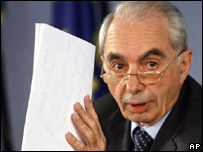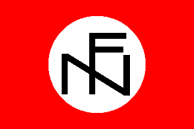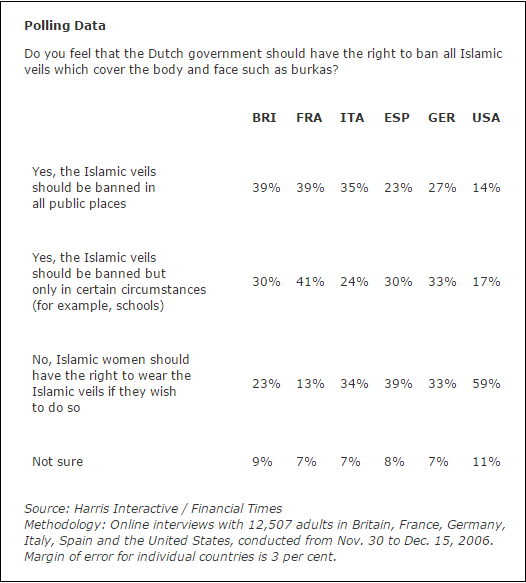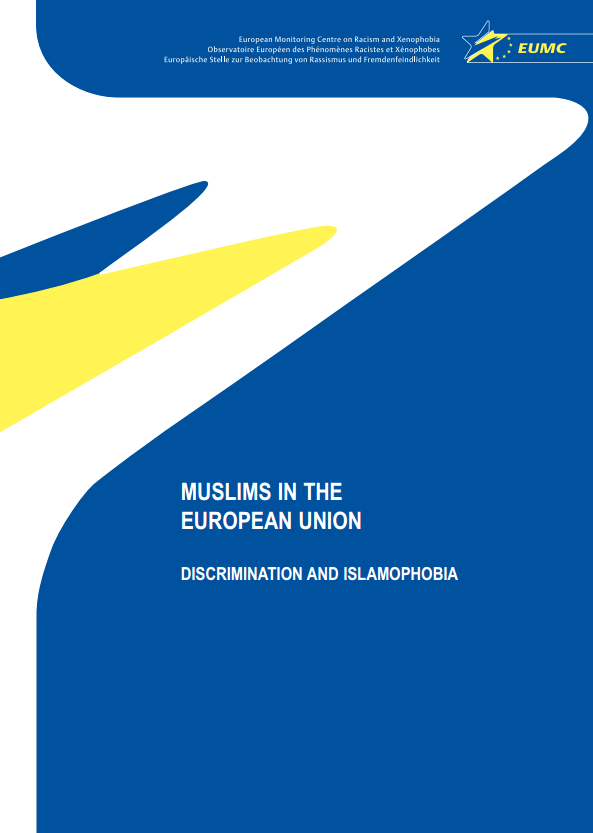Italy’s interior ministry has published a “values charter” for religious minorities that promotes integration while shunning polygamy and the wearing of face-concealing veils. Regarding the veil, it says that while “no restrictions on clothing exist in Italy … (veils that) cover the face are not acceptable because they prevent the recognition of the person and are an obstacle for establishing relationships with others.”
Category Archives: Italy
Bertinotti removes anti-Muslim painting
Over at Jihad Watch, Robert Spencer posts an indignant report that “the president of the Italian Chamber of Deputies, the communist Fausto Bertinotti, has had removed a painting showing a scene from the Battle of Lepanto from the hall in which he receives visitors to this lower house of parliament…. Bertinotti says it is a gesture of peace and dialogue, the painting’s title being ‘Naval battle between Christians and barbarians’, but an anonymous insider reveals it was done to avoid offending Muslims”.
And good for comrade Bertinotti, we say. Voting against the funding of Italian troops in Afghanistan would have been even better, though.
Europe muzzles Muslim intellectuals
Several prominent Muslim intellectuals are increasingly being barred from addressing international gatherings and delivering lectures across Europe on the grounds of extremism or anti-Semitism.
“We face many hurdles while planning for our annual Bourget conference,” Lhaj Thami Breze, Chairman of the Union of French Islamic Organizations (UOIF), told IslamOnline.net. “We want to invite prominent Muslim scholars from around the world but are always confronted with a long blacklist of people we can not invite.”
The four-day Bourget conference, the biggest Muslim convention in Europe, attracted last year more than 150,000 Muslims from across the continent. “Many moderate Muslims from the East and West, including prominent European thinkers, are banned from attending,” Breze said.
He cited Swiss-based prominent Muslim scholar Tariq Ramadan and his brother Hany, the director of the Islamic Center in Geneva.
BBC poll on Clash of Civilisations
Of the Western countries polled, the UK comes out reasonably well, as does Italy. Only 15% of British respondents and 14% of Italians think a violent clash between “Muslim and Western cultures” is inevitable, compared with 31% in the USA and 39% in Germany.
Dead writer’s words fan flames of Islamophobia
Dead writer’s words fan flames of Islamophobia
By Alfio Bernabei
Searchlight, February 2007
A RACIST CALL to blow up a mosque made by Italy’s best selling writer Oriana Fallaci seems to be achieving some of its intended effect, with a little help from rightwing parties.
In that famed part of Tuscany nicknamed Chiantishire, Islamophobia, fanned by Fallaci’s incendiary remarks, reached a peak in December with a second demonstration against the building of a mosque in Colle Val d’Elsa, a town of 14,000 inhabitants near Siena.
While the majority of the protesters recited the Lord’s Prayer, neo-fascists acted as Fallaci’s foot soldiers. The building site came under attack, not for the first time. Metal barriers were torn down and metal poles, which were part of the foundations, uprooted. Among the attackers police identified Forza Nuova militants who had vowed to launch a crusade “to protect our traditions”.
In a separate incident a few days earlier, the severed head of a pig was thrown at the entrance to the building site. Around 1,000 Muslims live in the area, working in farming.
Such protests are nothing new – they have occurred in Genova, Lodi and Padova, among other places, over the past few years. Rightwing political parties, such as the xenophobic Northern League, the neo-fascist National Alliance and Forza Italia, can count on hundreds of their members to take to the streets when demonstrations are called against the erection of mosques. The nazi-fascists always rush to the scene, eager to be seen at the forefront of such protests. Forza Nuova has issued leaflets linking all mosques and Muslims with terrorism, saying: “There is no such thing as a moderate Islam, no mosques to be allowed in our land”.
The current incidents at Colle Val d’Elsa have acquired special significance because of the ghost of a celebrity hovering in the background and questions about the role that certain media can play in fanning the flames of racism, whether through editorial misjudgement or, as some have suggested, by design, wanting to espouse the doctrine of a clash of civilisations.
Fallaci, who died last September, had a house in the area. Interviewed in June 2006 by The New Yorker she said that rather than see a mosque intruding in her beloved environment, she would obtain explosives and blow up the building. “I will go to my friends in Carrara, you know, where there is the marble. They are all anarchists. With them, I take the explosives. I make you juuump [sic] in the air. I blow it up! I do not want to see this mosque – it’s very near my house in Tuscany. I do not want to see a 24-metre minaret in the landscape of Giotto … So I BLOW IT UP!”
In Tuscan hills, mosque stirs deep fears
COLLE DI VAL D’ELSA, Italy — For centuries, bells in a towering Catholic church have tolled daily in this honey-colored town that embodies Tuscan serenity with its landscape of cypress trees and rolling farmland.
But now the start of building work for a mosque in a town park has shattered that tranquillity, laying bare deep suspicions of Muslims which underlie a broader unease in Italy over its growing immigrant population.
A severed pig’s head was found outside the mosque site in an apparent mafia-style intimidation effort a month ago, while construction that began with the mayor’s blessing is now accompanied by noisy protests.
The mosque’s opponents say they have nothing against Colle di Val d’Elsa’s roughly 400 Muslims, but fear it will trigger an influx of others bringing extremist influences. They also complain it takes up too much space in a communal park.
“This is not a big city and we don’t know if there will be an invasion of Muslims,” said Letizia Franceschi, a lawyer who leads a group against the mosque. “Unfortunately, it is written in all the national newspapers that in many mosques they preach hatred and teach activities that are illegal in our country.”
Outside the mosque site, a small group of longstanding residents protests regularly in tents with the Italian flag fluttering on top. Many driving by wave and honk in support.
Prominent signs reading “Yes to integration, No to occupation” and “The park is for everyone, not the mosque” dot a farm opposite the site. Local newspapers run headlines asking who financed the mosque, echoing a wider fear that it could be funded by extremist groups.
If completed, Colle di Val d’Elsa’s mosque will become only the fourth major mosque in Italy. After meeting for years in a small, dark room with Oriental rugs on the floor and pictures of the holy city of Medina on the walls, the town’s Muslims were ready for a larger space, said their Sunni Muslim imam, Feras Jabareen.
He has tried to show locals they have nothing to fear and that he preaches moderate Islam, to no avail. The Muslim community has signed Italy’s only existing declaration of cooperation with a town hall and even planted a Christmas tree at the mosque site in a goodwill gesture recently.
“The construction of this mosque has unfortunately become politicized, making it easy to create controversies and accusations,” said Jabareen, clutching prayer beads. “Rome has the biggest mosque in Europe – do people think Muslims come to Rome just because it has the biggest mosque? That’s absurd.”
Colle di Val d’Elsa’s mayor is tired of the controversy. The town has rejected two requests for a referendum on the issue. “A wall between the two communities is the last thing we want,” said center-leftist mayor Paolo Brogioni. “The Muslims are just as much residents of the town as any other.”
No foreign finance for Italian mosques
 ROME: Italy’s interior minister said the threat of terrorism remains a reality in Italy, and vowed to take a close look at who is financing Italy’s many mosques and who is teaching at Islamic schools.
ROME: Italy’s interior minister said the threat of terrorism remains a reality in Italy, and vowed to take a close look at who is financing Italy’s many mosques and who is teaching at Islamic schools.
Giuliano Amato proposed following France’s example of creating a foundation to manage money destined for religious groups, in remarks published Friday in Italy’s leading dailies and confirmed by his office.
“The spread of mosques in Italy that are built with money from foreign states is unacceptable,” Amato told Italian reporters. “There’s something about that that I don’t like. I want to know who is financing what in my country.”
Last year, France created a new foundation to handle financing for France’s Muslim community, for building and renovating mosques and other projects. The foundation has representatives on the board and allows France’s government to play a role in the issue, without breaking its 1905 rule that forbids the government from financing religions.
“The idea is to at least have foundations so we can have some transparency,” said Amato’s spokesman, Fabrizio Forquet. In Italy “mosques are set up by whomever and are financed by such foreign countries as Saudi Arabia,” Forquet added. “So what are these mosques? Are they a religious site or centers for propaganda?”
Hamza Roberto Piccardo, secretary of the Union of Islamic Communities in Italy, an umbrella group for Italy’s Muslims that has a reputation for radicalism, dismissed the idea.
“Free church in a free country, that’s all I’m going to say,” Piccardo said. “The constitution says religious communities set themselves up according to their own statutes, and a secular state only needs to worry that everything is done legally.”
Associated Press, 5 January 2007
See also “Italy to monitor mosque funding”, BBC News, 5 January 2007
Muslims victimised over mosque plan
 One of Tuscany’s oldest and most idyllic hill-top towns is in turmoil over the building of a large mosque, with a golden dome and an illuminated glass minaret.
One of Tuscany’s oldest and most idyllic hill-top towns is in turmoil over the building of a large mosque, with a golden dome and an illuminated glass minaret.
For 20 years, the 14,000 residents of Colle di Val d’Elsa have had a community of around 300 Muslims living among them. A small Islamic cultural centre was established years ago, but the atmosphere of peaceful cohabitation has turned sour after proposals for a much bigger centre incorporating a mosque.
A severed pig’s head was left outside the gates of the site, where work has begun. Anti-Muslim graffiti has appeared on walls and local Muslims have been pelted with sausages. Last weekend, 500 people, many of them fascists from a group called Forza Nuova (New Force), staged a protest.
“The things that have been happening are very wrong, and out of character for the town,” said Paolo Brogioni, the mayor of Colle, whose Muslim community now does not venture out on to the cobbled streets.
Americans oppose Dutch Islamic veil ban
Many adults in the United States are against a proposal developed by the Dutch government that seeks to ban Islamic veils, according to a six-country poll by Harris Interactive published in the Financial Times.
59 per cent of Americans believe Islamic women should have the right to wear the garments if they wish to do so.
Support is significantly lower in the five European nations surveyed, with Spain at 39 per cent, Italy at 34 per cent, Germany at 33 per cent, Britain at 23 per cent, and France at 23 per cent.
Angus Reid Global Monitor, 31 December 2006

Islamophobia takes a grip across Europe
 Muslims are suffering physical attacks, verbal taunts and widespread discrimination as a climate of Islamophobia takes a grip across Europe.
Muslims are suffering physical attacks, verbal taunts and widespread discrimination as a climate of Islamophobia takes a grip across Europe.
A new report lists a host of examples of crime and intimidation from arson and suspected racist murder in Germany and Spain to pork fat being smeared on a mosque in Italy.
Thugs in Ireland beat up one man after calling him “bin Laden” while a bogus email in Denmark outlined fake primary school reforms to help migrant children. A maths question read: “Jamal has an AK47 with a 30-shot magazine. If he misses 6 out of 10 shots and he wants to hit each cup 13 times, how many cups can he shoot before he needs to reload?”
The report from the European Monitoring Centre on Racism and Xenophobia called on leaders to strengthen policies on integration, and on Muslims to “engage more actively in public life.” It also highlights the lack of reliable data, pointing out that only one country – the United Kingdom – publishes criminal justice data which specifically identify Muslims as victims of hate crime incidents.
The Muslim population of the EU is estimated to run to around 13m, around 3.5 per cent of the total. Since September 11 many feel “they have been put under a general suspicion of terrorism,” according to Beate Winkler, director of the centre.
The report says that Muslims “experience various levels of discrimination and marginalisation in employment, education and housing” and are “vulnerable to manifestations of prejudice and hatred in the form of anything from verbal threats through to physical attacks on people and property.”
